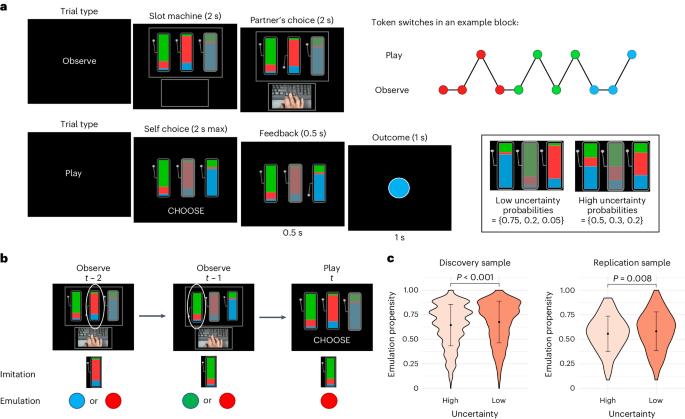Individual differences in autism-like traits are associated with reduced goal emulation in a computational model of observational learning
引用次数: 0
Abstract
The ability to infer the goals and intentions of others is crucial for social interactions, and such social capabilities are broadly distributed across individuals. Autism-like traits (that is, traits associated with autism spectrum disorder (ASD)) have been associated with reduced social inference, yet the underlying computational principles and social cognitive processes are not well characterized. Here we tackle this problem by investigating inference during social learning through computational modeling in two large cross-sectional samples of adult participants from the general population (N1 = 943, N2 = 352). Autism-like traits were extracted and isolated from other associated symptom dimensions through a factor analysis of the Social Responsiveness Scale. Participants completed an observational learning task to quantify the tradeoff between two social learning strategies: imitation (repeating the observed partner’s most recent action) and emulation (inferring the observed partner’s goal). Autism-like traits were associated with reduced observational learning specifically through reduced emulation (but not imitation), revealing difficulties in social goal inference (Pearson’s r = −0.124, P < 0.001). This association held, even when controlling for other model parameters (for example, decision noise, heuristics, F1,925 = 15.352, P < 0.001), and was specifically related to social difficulties in autism-like traits (F1,916 = 33.169, P < 0.001) but not social anxiety traits (F1,916 = 0.005, P = 0.945). The findings, replicated in an additional sample, provide a powerfully specific mechanistic hypothesis for social learning challenges in ASD, employing a computational psychiatry approach that could be applied to other disorders. Using a computational approach, Wu et al. find that autism-related traits are associated with reduced observational learning specifically through reduced goal emulation, revealing difficulties in social goal inference.

自闭症样特征的个体差异与观察学习计算模型中目标模仿能力下降有关
推断他人目标和意图的能力对于社会交往至关重要,而这种社会能力广泛分布于不同个体。类似自闭症的特质(即与自闭症谱系障碍(ASD)相关的特质)与社交推断能力下降有关,但其背后的计算原理和社会认知过程还没有得到很好的描述。为了解决这个问题,我们在两个大型横断面样本(N1 = 943 人,N2 = 352 人)中,通过计算建模研究了成年普通参与者在社会学习过程中的推理能力。通过对社交反应量表进行因子分析,从其他相关症状维度中提取并分离出类似自闭症的特征。受试者完成了一项观察学习任务,以量化两种社会学习策略之间的权衡:模仿(重复观察对象最近的动作)和仿效(推断观察对象的目标)。自闭症样特质与观察学习减少有关,特别是通过减少模仿(而不是模仿),揭示了社会目标推断方面的困难(Pearson's r = -0.124,P <0.001)。即使控制了其他模型参数(如决策噪音、启发式,F1,925 = 15.352,P <0.001),这种关联仍然存在,而且与自闭症样特质的社交困难特别相关(F1,916 = 33.169,P <0.001),但与社交焦虑特质无关(F1,916 = 0.005,P = 0.945)。这些发现在另一个样本中得到了重复,为 ASD 的社交学习挑战提供了一个强有力的特异性机理假设,并采用了一种可应用于其他疾病的计算精神病学方法。通过计算方法,Wu 等人发现自闭症相关特征与观察学习减少有关,特别是通过目标模仿减少,揭示了社会目标推断的困难。
本文章由计算机程序翻译,如有差异,请以英文原文为准。
求助全文
约1分钟内获得全文
求助全文

 求助内容:
求助内容: 应助结果提醒方式:
应助结果提醒方式:


